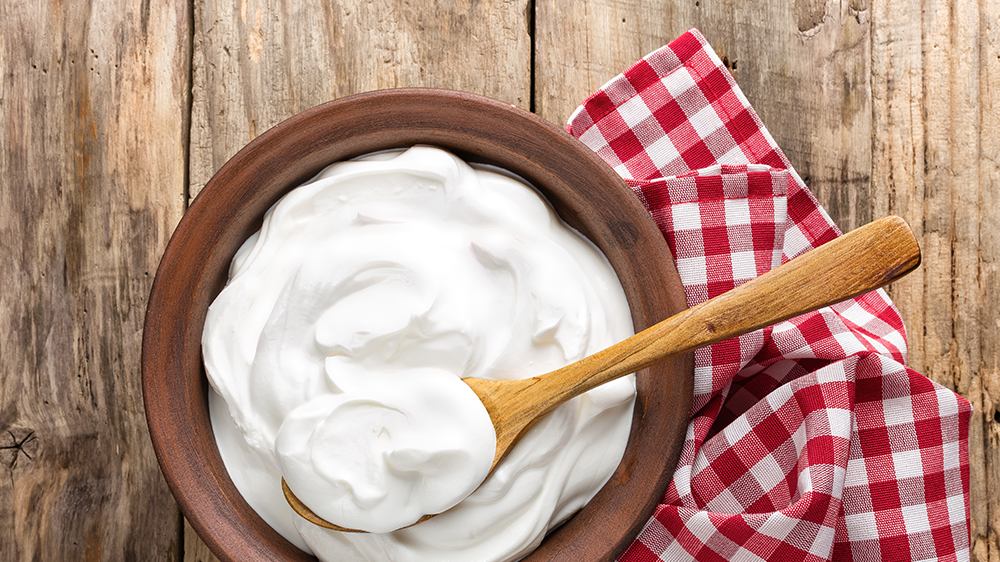What Nutritionists Want You to Know Before Eating Greek Yogurt

"Hearst Magazines and Yahoo may earn commission or revenue on some items through these links."
Thick, creamy Greek yogurt with crunchy granola and fresh fruit makes for a delicious breakfast that could easily double as dessert, which begs the question: Is Greek yogurt good for you? While this thick, luxurious-tasting product may seem indulgent, it offers a variety of health benefits and is a cinch to add to your diet in so many ways (think beyond the perfect yogurt parfait).
Meet the experts: Melissa Prest, D.C.N., R.D.N., national media spokesperson for the Academy of Nutrition and Dietetics and member of the Prevention Medical Review Board, and Keri Gans, M.S., R.D.N., C.D.N., registered dietitian nutritionist in New York City.
We asked registered dietitians for their advice and insight on how to enjoy Greek yogurt, and perhaps more importantly, why you should.
What is Greek yogurt?
Compared to conventional American-style yogurt, Greek yogurt goes through an extra straining process to remove the whey, a liquid that contains lactose. Because lactose is a natural sugar, plain Greek yogurt is lower in sugar than plain American-style yogurt, and removing the whey produces a thicker, creamier yogurt with a tart taste.
This relatively dense product also comes with a higher concentration of protein (sometimes twice as much protein per serving) and probiotics. Greek yogurt comes in no-, low-, or full-fat versions, just like other types of yogurt. The fat content comes from the type of milk used to make the yogurt.
Is Greek yogurt good for you?
Yogurt, in general, contains probiotics and calcium which are great for gut health, bone health, and heart health, says Melissa Prest, D.C.N., R.D.N., national media spokesperson for the Academy of Nutrition and Dietetics and member of the Prevention Medical Review Board. “Lower sugar options are better for most people,” she adds, “and Greek yogurt is thicker than conventional American-style yogurt and tends to be higher in protein and usually lower in sugar.” So it can definitely be a part of a balanced diet.
Greek yogurt health benefits
Supports muscle building and recovery
Compared to conventional American-style yogurt, Greek yogurt has fewer carbohydrates and almost double the protein, says Prest.
The average Greek yogurt contains around 15-20 grams of protein for a 6-ounce serving, or 30% of your recommended daily value, says Keri Gans, M.S., R.D.N., C.D.N., registered dietitian nutritionist in New York City. “Protein helps carry oxygen throughout our body; it builds, repairs, and maintains muscle mass.” This makes Greek yogurt a great post-workout meal.
Great for bone health
A 6-ounce serving of Greek yogurt contains around 20% of the recommended daily value for calcium, says Gans. “Calcium is important in the diet as it helps to build and maintain strong bones and teeth, as well as aid in blood clotting, muscle contractions, and nerve functions.” Adequate protein intake is also key for bone health.
Aids a healthy gut microbiome
Thanks to its probiotic content, Greek yogurt is important for gut health. If your Greek yogurt contains “live and active cultures,” then it contains probiotics, explains Gans. “Probiotics may help balance a person’s gut microbiome and promote digestive health.” One study found that yogurt consumption was associated with reduced visceral fat mass and positive changes in gut microbiome.
May reduce the risk of type 2 diabetes
Research has shown that consuming fermented foods, such as probiotic yogurt, is associated with a reduced risk of type 2 diabetes thanks to the microorganisms present interacting with the gut microbiome. Studies suggest this may have a connection with insulin resistance and weight management—two factors that may contribute to type 2 diabetes.
Could help lower cholesterol
One study found that consuming just over a cup of probiotic yogurt per day for six weeks improved the cholesterol levels of people with type 2 diabetes, potentially reducing cardiovascular disease risk factors.
Greek yogurt nutrition facts
Here is what you will get in one 7-ounce container of plain, low-fat Greek yogurt, according to the U.S. Department of Agriculture (USDA):
Calories: 146
Protein: 20 g
Fat: 3.8 g
Carbs: 7.9 g
Fiber: 0 g
Sugar: 7.1
Calcium: 230 mg, 19% of the daily value
Potassium: 282 mg, 6% of the daily value
Selenium: 24.8 mcg, 45% of the daily value
Greek yogurt is also a good source of magnesium, vitamin B12, and iodine, adds Prest.
Is Greek yogurt good for weight loss?
While eating Greek yogurt won’t help you magically drop pounds on its own, it may help with weight loss. Thanks to its high protein content, Greek yogurt “may aid in satiety at mealtime,“ says Gans. This means you’ll likely stay fuller for longer, consuming fewer calories throughout the day than you would after a lower-protein meal. Some research has even found that a high-protein diet can promote weight and fat loss compared to diets lower in protein, but more studies are needed.
How to enjoy Greek yogurt
Greek yogurt can be enjoyed solely on its own as a snack, or as breakfast, with fruit and/or nuts, or added to a smoothie, says Gans. Yogurt With Strawberries and Almond-Buckwheat Groats is particularly delicious!
There are also some easy ways to substitute Greek yogurt for similar ingredients. For example, you can use it instead of mayonnaise in a tuna, chicken, or egg salad, Gans suggests. Or, instead of sour cream on a baked potato, you can use Greek yogurt, she adds. “Greek yogurt can also be added to a salad dressing to make it creamier.”
You Might Also Like
